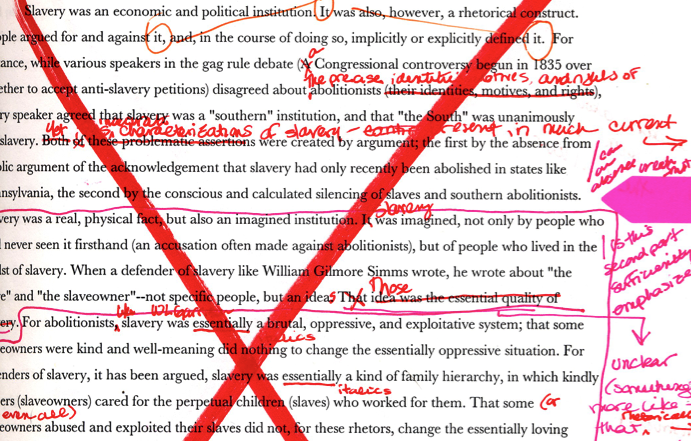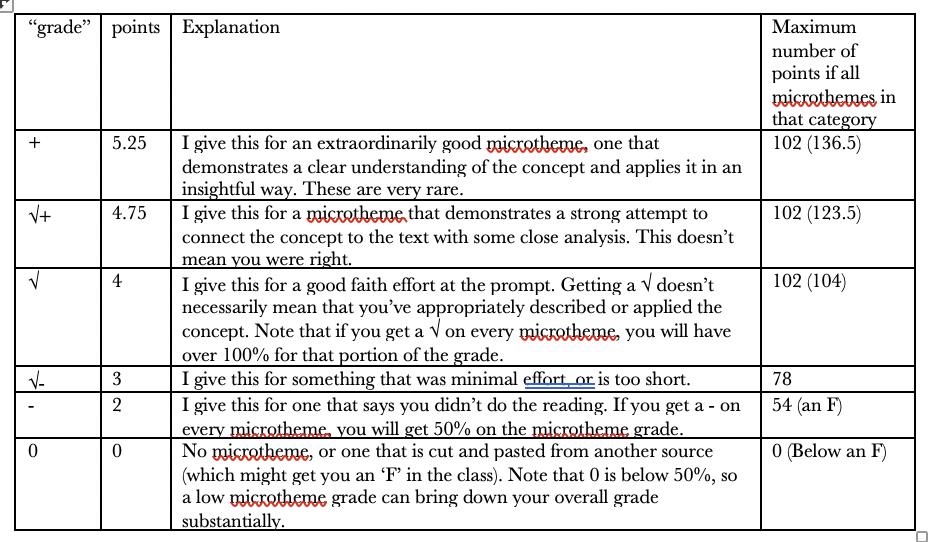
Basically, I’m saying that fyc teaches argument and not argumentation, and that fyc, as currently taught, often rewards demagoguery, unintentionally. It does so by encouraging students to assume there are two sides on every issue, and that those two sides are identities (“liberals” v. “conservatives,” or “pro-“ or “anti” whatever). If there is any discussion of fallacies (and most textbooks don’t mention), it appeals to modernist notions of fallacies,[1] and it encourages students to note the fallacies in out-group rhetoric. That’s useless. That just inflames demagoguery.
Teaching students how to identify what’s wrong with how some out-group of theirs argues doesn’t help our situation.
What’s wrong with our world is not that we have a war between people who are right and people whose arguments are stupid, villainous, fallacious, self-serving, and irrational. What’s wrong with our world is that far too many of us frame the vexed, nuanced, entangled, and uncertain world of policy choices as a choice between the obviously right option (advocated by people who are good, objective, compassionate, rational [aka, Us]) and all other options (advocated by people who are villainous, and the people who are stooges or tools of that villainous group [aka Them]).
What’s wrong with our world is that far too many people believe that our politics is a war of extermination in which “real” people are justified in abrogating all the norms of democratic discourse and constitutional restraints as pre-emptive self-defense against the group that is trying to destroy us. That is the argument of Trump supporters, and that is what makes their rhetorical and political agenda anti-democratic. Like Stalinists, they argue that they are justified in violating all norms because we are in an apocalyptic war of identity (people who are good v. people who are bad). Trump supporters are far from alone in making that argument–people all over the political spectrum do; some more than others.
People out to destroy democracy rarely see (or describe) themselves as doing that. They see themselves as instituting a real democracy, a democracy of the only group that has a legitimate understanding of political issues. They believe that, by destroying all democratic norms and legal procedures, they are purifying the nation of the people who prevent a real democracy. They destroy the village in order to save it.
The problem isn’t that they’re bad people; the problem is that they’re people who believe that no point of view other than theirs, and no policy agenda other than theirs, is worth considering. Thus, getting out of a culture of demagoguery doesn’t mean abrogating the norms and rules of demcracy in order to exterminate the group that is threatening democracy. That is exactly what people who destroy democracies argue.
Saving democracy means saving the norms and legal practices of democracy. But how do you do that when a large part of the population is drinking deep of the Flavor-Aid that our group is threatened with extermination by Them, and therefore we are justified in anything we do?
That’s where courses in argumentation can do good work.
One way to get out of that culture is to show that we are not in a zero-sum battle between two groups. This isn’t to say that all positions are equally valid; it is to say that there aren’t just two. We have many potentially reasonable disagreements about policy that are not accurately described as a binary. Of course, there are people and groups who will crush anyone who disagrees with them, who will violate all norms in order to get their way, and those people (and groups) should be condemned and constrained. But, that someone disagrees with us is not proof that they a member (or tool) of those authoritarian groups. Not everyone who disagrees with us is a tool or villain. Some are, but not everyone. There are also people who are mistaken, deluded, gullible, ignorant, constrained in our understanding, and we are that people.
Making fyc a class in civics doesn’t mean giving students tools that will enable them to argue that their or our out-group(s) is/are irrational and bad. It should be a course in which the teachers are committed to teaching students how to figure out when their in-group is mistaken, deluded, gullible, ignorant (which means modelling acknowledging when our in-group is mistaken and so on). It would mean showing that our policy options are never a binary. Achieving that goal would mean teaching students argumentation, and not argument.
Teaching argument means teaching students to perform the moves we associate with an argument, and it restricts the teaching of logic to the formal fallacies. From the perspective of civics, this approach is useless since an argument might be formally right and yet still fallacious. “All bunnies are fluffy. This animal is not fluffy; therefore it is not a bunny.” That argument is formally correct—the problem is not the form, but that the major premise is false.
In formal logic, truth doesn’t matter; in informal logic, it does. Goebbels’ arguments followed logically from his premises, and his major premises are untrue. They also are inconsistent with major premises of many of his other arguments, but that’s a different post (and it’s how we get out of the problem of “logical argument” simply being a synonym for “argument I think is true”).
Goebbels would get an ‘A’ in any class that only relied on the formal fallacies. Where Goebbels would fail is in regard to fallacies relevant to informal argumentation: 1) did he engage the best criticisms of his argument? 2) did he hold his interlocutors to the same standards of logic and evidence to which he held himself? 3) did he represent his opposition fairly?[2] 4) is his overall argument internally consistent? (5) could he cite non-in-group sources to support his claims about “facts”?
If we’re going to talk about fallacies, let’s do it well—in ways grounded in current scholarship in cognitive biases and argumentation. There are a lot of ways that a person could teach a class grounded in either set of scholarship, and I’ll get to them later, but, mostly, they involve students identifying their own tendency to reason fallaciously/rely on cognitive biases.
And there is one hard rule on which I’ll insist: that approach means “open” assignments are off the table if we’re claiming to teach argumentation and not argument. It isn’t ethical for a teacher to claim to teach argumentation and let each student write about whatever issue interests that student because the teacher can’t possibly assess the resulting papers in terms of argumentation. You can teach argument that way, and you can also teach lots of other wonderful things, but not argumentation.
And here we’re back to my claim that fyc doesn’t have to teach argumentation. It really doesn’t.
I think a major problem in our field, and one reason we get into unproductive and uninteresting argybargies, is that there is an underlying assumption that all fyc programs should have the same goal—that there is this thing, an eidos fyc, and we are all trying to achieve it. I think we should walk away from the notion that all fyc programs should have the same goals, and consider fyc to be strategic and local. The goals of any fyc program should be determined, not on the basis of what “the field” says should happen, but on the basis of what is most useful for the first year students of that institution. I think that decision should be informed by scholarship in rhetoric and composition, but I also think that scholarship in rhetoric and composition doesn’t support the claim that all programs should have the same goals.
But, back to assuming that the goal is teaching students to engage responsibly in civic discourse. If an instructor is going to claim to teach argumentation (and not just argument), then we have to know whether a student has accurately represented opposition arguments, is engaging the smartest opposition arguments, and is not relying on a binary. There is no way a person can know that about every issue on which any student might write. We can only think we know the best opposition on every issue if we apply modernist notions of fallacies (and react to things like tone), assume that one source always has the best argument (usually in-group), or if we ourselves think in terms of a binary (and so ask that students engage the “liberal” and “conservative” or “pro-“ and “anti-“ on every issue). As I used to say to my son when I advised him not to do something, “Guess how I know this.”[3]
I’m not saying we have to have “closed” assignments, in which students write only about a text or small set of texts picked by the instructor. Down that road lies not only boredom but actually loathing the most important part of our job: responding to students’ papers in a way that models how they should respond to arguments they read.
There are a lot of ways that teachers can constrain paper topics so that there are papers on a variety of topics, and yet a teacher can notice if the opposition has been misrepresented. I’ll explain a representative sample of them later. Here I’ll simply note that many of those teachers (like me) didn’t figure out how to do it while teaching fyc. (Or even for some time after.) I’m not, just to be clear, saying that the field of rhetoric and composition fails to teach argumentation; there are lots of people, and lots of texts, that do great jobs at it. I’m saying fyc doesn’t, but it claims to. And that is the problem.
There are lots of strategies, including not teaching argumentation. But, and this is the important point of this post, if we’re going to say that, as teachers, we can grade something as a good or bad argument without knowing the controversy well enough to know whether a student has accurately represented the smartest opposition, even though we haven’t read the sources about which the student is writing, we are modelling how disagreement works on the internet, when people believe they can assess the quality an argument without actually reading it.
We’re thereby making things worse.
[1] I mean “modernist” in almost the technical sense—late nineteenth and early twentieth century Anglo-American rejections of Anglo-American Enlightenment models of the mind. What I’m calling “modernist” is often called “Enlightenment,” but that’s inaccurate. The Anglo-American Enlightenment didn’t accept the Cartesian mind/body rational/irrational split. For the Anglo-American Enlightenment philosophers, there wasn’t a binary. So, for instance, sentiment assisted deliberation, but passion didn’t. So, they didn’t believe that “emotions” were irrational. It seems to me that it wasn’t until the late nineteenth and early twentieth century that Anglo-American philosophy assumed the rational/irrational split (when, by the way, a lot of classical texts were translated into English, so they show that bias).
[2] I’ve come to think this and the second are the most important. When people are engaged in demagoguery, they homogenize all non- in-group members into one, and then pick the most useful—even if completely an outlier—quote or individual to represent all non-in-group members.
[3] He once asked, “Is there anything you didn’t learn the hard way?”








